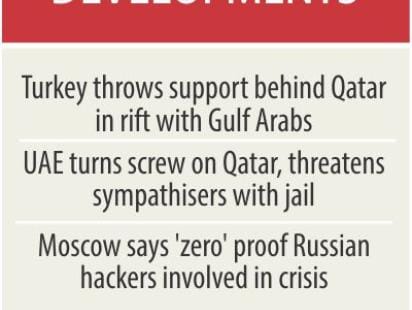Not seeking 'regime change'
A senior Emirati official yesterday insisted that Gulf Arab states were not seeking regime change in Doha, as tensions built in a bitter feud between Qatar and its neighbours.
Speaking to AFP in Dubai, the United Arab Emirates' state minister for foreign affairs Anwar Gargash accused Qatar of being "the main champion of extremism and terrorism in the region".
But he also said measures taken against Qatar this week by Saudi Arabia, the UAE and other Arab nations were not aimed at seeking new leadership in Doha.
"This is not about regime change -- this is about change of policy, change of approach," Gargash said.
Saudi Arabia, Egypt, the UAE and Bahrain announced on Monday they were cutting diplomatic ties and closing air, sea and land links with Qatar, giving Qataris within their borders two weeks to leave.
The four countries have suspended all flights to and from Qatar, pulled their ambassadors from Doha and ordered Qatari diplomats to leave.
Riyadh and its allies accuse Qatar of supporting extremist groups and of serving the interests of regional arch-rival Iran, claims Doha has strongly rejected.
The dispute has sparked the worst diplomatic crisis in the Arab world in years and raised fears it will cause further instability in an already-volatile region.
Kuwait is leading efforts to find a mediated solution. Its Emir Sheikh Sabah al-Ahmad Al-Sabah held talks with Saudi King Salman on Tuesday but there were no immediate signs of progress.
The United States, France and Russia have called for dialogue while Turkey has defended Qatar and said it would further "develop" ties with Doha.
US President Donald Trump waded into the dispute on Tuesday, but seemed to only muddy the waters. After first appearing to back the Saudi-led measures against Qatar on Twitter, he shifted gears and called for unity among Gulf Arab states.
German Foreign Minister Sigmar Gabriel accused the US president of fanning conflict in the Middle East and risking a "new spiral in arms sales" with his remarks.
"Such a 'Trumpification' of relations in a region already susceptible to crises is particularly dangerous," Gabriel said in an interview scheduled to appear yesterday.

Qatar has said it is open to talks to end the crisis but has also accused its neighbours of impinging on its sovereignty.
The UAE meanwhile warned that anyone showing sympathy with Qatar could face 15 years jail time or fines.
Meanwhile, Moscow yesterday dismissed allegations that Russian hackers helped spark the diplomatic crisis around Qatar, after CNN reported that US officials believed they planted a false news story.
CNN reported on Tuesday that US intelligence officials believe Russian hackers planted a false news story that led Saudi Arabia and several allies to sever relations with Qatar.
 For all latest news, follow The Daily Star's Google News channel.
For all latest news, follow The Daily Star's Google News channel.
Comments